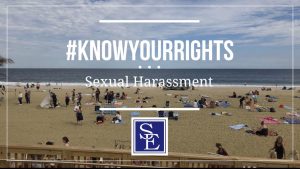For many teens, a summer job is a rite of passage, a way to earn money and gain independence, and start the transition into adulthood. For many teen girls working for Ocean City Beach Patrol, their summer lifeguarding jobs allegedly also came with unwanted groping, sexual harassment and sexual assault at the hands of their male supervisors. In recent news, local media sources have reported that a viral Instagram account called @ocbp_predators has led the Cape May County Prosecutor’s Office to investigate hundreds of allegations of sexual harassment and assault by members of the Ocean City Beach Patrol (OCBP). Reading through the accounts is disturbing. According to the anonymous posters, most of the misconduct was perpetrated by adult men in their thirties and forties against teenaged female lifeguards working for the OCBP.
 Providing a link to RAINN, the national sexual assault hotline, the Instagram account contains allegations of male guards, some of whom are also teachers in Ocean County public schools, being involved in incidents where their teenaged direct reports were continuously sexualized at work and plied with drugs and alcohol at after-work parties, where often they would wake up unaware of what had happened to them the night before. Several of the Instagram posts referred to older male lifeguards repeatedly citing New Jersey’s age of consent, which is 16, to assert their entitlement to have sexual contact with the younger girls they supervised. However, New Jersey bars any adult in a position of authority having sexual contact with employees under the age of 18.
Providing a link to RAINN, the national sexual assault hotline, the Instagram account contains allegations of male guards, some of whom are also teachers in Ocean County public schools, being involved in incidents where their teenaged direct reports were continuously sexualized at work and plied with drugs and alcohol at after-work parties, where often they would wake up unaware of what had happened to them the night before. Several of the Instagram posts referred to older male lifeguards repeatedly citing New Jersey’s age of consent, which is 16, to assert their entitlement to have sexual contact with the younger girls they supervised. However, New Jersey bars any adult in a position of authority having sexual contact with employees under the age of 18.
It seems clear that if the allegations against the male lifeguard supervisors are true, they could be facing criminal penalties, but that is not always the case. Sexual assault against teenagers is a significant societal problem that often goes unaddressed. According to TeenHelp.com, teenagers account for at least half of all reported instances of sexual abuse, with teens of working age (16-19) being over three times as likely as the general public to be victims. Additionally, once victimized, the same teen is more likely to experience further abuse, and when the victim is a high school aged female, she is more likely than others to develop eating disorders, risky sexual behaviors, unwanted pregnancies, and suicidal ideation. Despite these staggering statistics, less than one-third of sexual assaults against teens are reported. The low reporting rate may be due in part to the fact that only about half of abusers are eventually arrested and a measly 16% are imprisoned. Of those who do go to jail for their crimes, the average sentence is about 4 months. Approximately 80% of jailed rapists report that their victims were under the age of 18. What laws, other than the criminal code, are there to protect these girls?
 New Jersey Employment Lawyers Blog
New Jersey Employment Lawyers Blog

